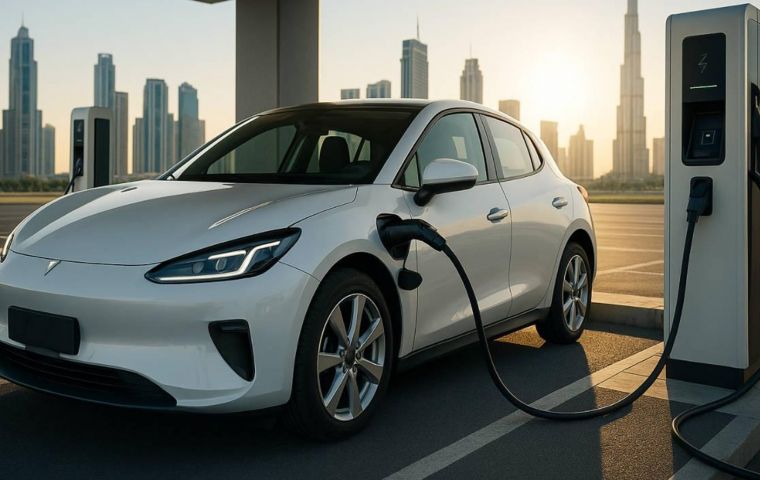MercoPress. South Atlantic News Agency
Green Leasing: Sustainable Options in Leased Equipment / EVs for Urban Areas
 Green leasing is not only about contracts. It is part of a cultural transition: ownership to access, consumption to responsibility
Green leasing is not only about contracts. It is part of a cultural transition: ownership to access, consumption to responsibility Leasing has always been about flexibility. But now, it is also about responsibility. A growing trend called green leasing is reshaping how companies and individuals approach leased equipment and electric vehicles (EVs). Instead of focusing only on cost and convenience, green leasing puts sustainability at the center. This shift is not accidental—it’s a response to global demands for lower emissions, energy efficiency, and smarter resource use.
What Is Green Leasing?
Green leasing refers to agreements that encourage or require the use of environmentally friendly assets. These can include:
- Electric Vehicles (EVs) in corporate fleets or personal use.
- Energy-efficient equipment for construction, farming, or offices.
- Renewable-powered solutions, such as solar-backed machinery or EV chargers.
Unlike traditional leasing, which focuses only on financial terms, green leasing also includes clauses about carbon footprint reduction, recycling, and energy use monitoring. In simple words, it connects money with environmental accountability.
Why Is Green Leasing Rising?
A few numbers help explain the trend:
- The EV leasing market is expected to grow at over 12% CAGR between 2024 and 2030.
- Companies report that sustainable procurement policies improve customer trust by nearly 30%, according to industry surveys.
- Over 70% of younger consumers prefer businesses that adopt eco-friendly practices.
These figures tell a clear story: demand is shifting. People want the convenience of leasing without the guilt of environmental harm.
Novels are also involved. How? Platforms for CEO romance novels read online are better known for creative digital tools, even hinting at this cultural transition. While FictionMe operates in the free novels online space, the brand's appeal shows how audiences reward fresh, responsible, and modern approaches. The logic of novel promotion applies to leasing.
EV Leasing: A Clear Example
Leasing electric vehicles offers a triple advantage:
- Lower emissions. EVs reduce greenhouse gas emissions by up to 50% over their lifecycle compared to combustion cars.
- Lower running costs. Fuel savings and government tax incentives often make EVs cheaper month-to-month.
- Technology upgrades. Leasing allows businesses and individuals to stay current with rapidly improving EV technology, avoiding the risk of owning outdated models.
Many businesses are turning their fleets electric through green leasing contracts. For example, a logistics company might lease 100 EV vans instead of diesel ones. In doing so, they cut emissions, but also show customers they care about sustainability. This is branding and environmental responsibility wrapped together.
Sustainable Equipment Leasing
It’s not only cars. Heavy equipment—tractors, loaders, office printers, or servers—can also be leased with sustainability in mind. Green leasing often ensures:
- Energy-efficient models.
- Recycling or reuse commitments at end-of-life.
- Shared ownership models that reduce waste.
Think about construction. Instead of buying diesel-powered machinery, a company could lease hybrid or electric equipment. This lowers on-site pollution and aligns the project with green building certifications.
Even in creative industries, sustainability is creeping in. Writers often choose to release Android or iOS novels to reduce waste and use resources more wisely. Especially since reading novels online on platforms like FictionMe is currently trending. This means that publishing and reading novels online not only contributes to a sustainable lifestyle but also allows for community building around the world.
Benefits of Green Leasing
Why choose green leasing? The reasons are practical and cultural:
- Financial Flexibility: Leasing spreads costs over time.
- Sustainability: Reduced emissions, better energy use, and support for green policies.
- Regulatory Compliance: Governments increasingly reward sustainable practices with tax credits or penalties for non-compliance.
- Reputation: Customers and partners trust businesses that adopt visible eco-friendly strategies.
- Innovation Access: Technology evolves quickly; leasing ensures companies don’t get stuck with outdated equipment.
It’s not only large corporations that benefit. Small and mid-sized businesses gain access to the same cutting-edge tech through leasing, something outright purchases often block.
Challenges and Considerations
Of course, not every deal is perfect. Green leasing has its hurdles:
- Initial leasing rates for eco-friendly equipment can be 10–15% higher than standard options.
- Infrastructure challenges, like EV charging stations, can slow adoption.
- Education gaps—many managers don’t yet know how to negotiate or enforce green clauses.
But, step by step, these barriers are shrinking. Markets expand, costs drop, and knowledge spreads.
The Bigger Picture
Green leasing is not only about contracts. It is part of a cultural transition: ownership to access, consumption to responsibility. Just as digital tools like FictionMe remind us that stories can be reshaped without printing presses, leasing models remind us that access to sustainable technology matters more than outdated ownership ideals.
Sustainability isn’t a trend that fades. It has become the standard. And leasing—by nature flexible—fits perfectly into this new reality.
Final Thoughts
Green leasing is not a buzzword—it’s a tool. A practical one. Leasing electric vehicles, efficient machines, or even small office devices with sustainability in mind creates measurable benefits. Lower emissions, lower costs, and stronger trust.
As adoption grows, businesses and individuals should start asking: Why lease traditionally when green leasing is possible? If the answer is “habit” or “lack of awareness,” then the market still has work to do. But the future leans green, and leasing is following right behind.




Top Comments
Disclaimer & comment rulesCommenting for this story is now closed.
If you have a Facebook account, become a fan and comment on our Facebook Page!